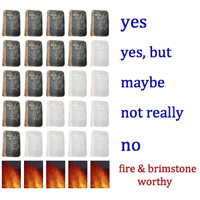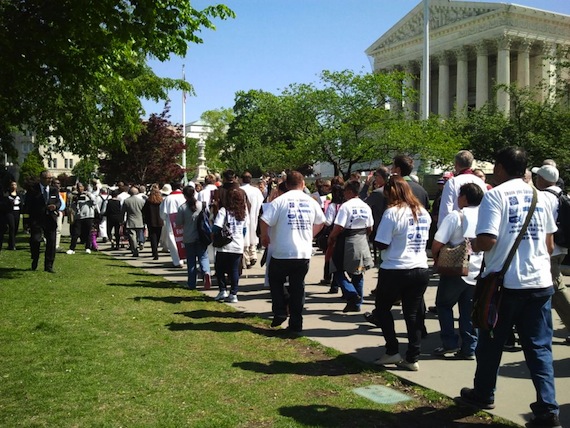
"They welcomed the message very eagerly
and examined the scriptures every day
to see whether these things were so"
--Acts 17:11
As we make our way toward the 2012 elections, many feel tossed to and fro by often contradicting claims about what the Bible says on this or that political issue. Most people just don't know the Bible well enough to say whether these claims are right, wrong, correct, incorrect or a matter of interpretation. How can we keep political Biblespeak honest? Inspired by PolitiFact.com, BibliFact roundups aim to do just that.

ROUNDUP #3: SB 1070, BIBLICAL ALIENS, AND A JERICHO MARCH
On April 25, the U.S. Supreme Court heard oral arguments concerning Arizona Senate Bill 1070, which, among other anti-immigration reform measures, requires all aliens over 14 to carry proof of registration at all times, calls on law enforcement officials to stop anyone whom they suspect might be an illegal alien, and cracks down on anyone who shelters illegal aliens. As the court deliberated whether to uphold the bill, a large group of religious leaders, laypersons, and other community leaders gathered for what they called a "Jericho March" around the courthouse in opposition to this and related initiatives.

Jericho marches, also known as "victory" or "glory" marches, have their roots in Pentecostal traditions of worship, in which someone, moved by the spirit, spontaneously arises and begins walking or running up and down and around the aisles while shouting or singing praises to God. Soon others catch on and join the train, which coils around the sanctuary like a charismatic Congo line. The biblical story that more or less inspires such marches is the battle of Jericho in the book of Joshua. There the Israelite army marches around the walled city of Jericho once per day for six days, and then seven times on the seventh day. Then a ram's horn is sounded, all the soldiers shout out, and the walls come tumbling down. The biblical connection to Pentecostal Jericho marches seems pretty loose -- circling the worship space while giving voice to an experience of collective spiritual victory. A political-religious Jericho march around the high-walled SCOTUS, on the other hand, seems to bear a slightly more combative connotation.
As we might expect, moreover, these Jericho marchers, along with many other religious groups that you wouldn't normally dare put in a room together, proclaim biblical grounds for their faith-based denunciations of SB 1070 and similar laws. Among the most outspoken is Rev. Gabriel Salguero, president of the National Latino Evangelical Coalition, whose "Building Bridges" campaign seeks to educate the public "about Biblical and Evangelical teaching on migration and immigrants" and to "create political will" for humane immigration reform. As he told a packed audience in a voter mobilization and registration worship service in Cleveland on April 21, "We're saying let's look at what the Bible has to say about immigrants and poor people and education."
 Reverends Gabriel and Jeanette Salguero
Reverends Gabriel and Jeanette Salguero
"'Hospitality is not at the margins of scripture. Jesus wasn't kidding around when he said, 'I was a stranger and you welcomed me.'" -- Gabriel Salguero, G92 South Immigration Conference, Samford University, Feb. 23, 2012; retweeted by Rev. Salguero from Washington, D.C., April 25, 2012.
 This is the surprising punchline of Jesus' description of the final judgment of the nations in Matthew 25:31-46. Then, he says, the Son of Man "will separate people one from another as a shepherd separates the sheep from the goats." To the former, he will say, "Come, you that are blessed by my Father, inherit the kingdom prepared for you from the foundation of the world; for I was hungry and you gave me food, I was thirsty and you gave me something to drink, I was a stranger and you welcomed me, I was naked and you gave me clothing, I was sick and you took care of me, I was in prison and you visited me." But they will be surprised and ask when they ever did those things, to which he will respond, "Truly I tell you, just as you did it to one of the least of these who are members of my family, you did it to me." The latter group, by the way, will be equally surprised when they are cursed and told, "just as you did not do it to one of the least of these," including the stranger, "you did not do it to me." And Reverend Salguero is right: Jesus does not appear to be kidding around.
This is the surprising punchline of Jesus' description of the final judgment of the nations in Matthew 25:31-46. Then, he says, the Son of Man "will separate people one from another as a shepherd separates the sheep from the goats." To the former, he will say, "Come, you that are blessed by my Father, inherit the kingdom prepared for you from the foundation of the world; for I was hungry and you gave me food, I was thirsty and you gave me something to drink, I was a stranger and you welcomed me, I was naked and you gave me clothing, I was sick and you took care of me, I was in prison and you visited me." But they will be surprised and ask when they ever did those things, to which he will respond, "Truly I tell you, just as you did it to one of the least of these who are members of my family, you did it to me." The latter group, by the way, will be equally surprised when they are cursed and told, "just as you did not do it to one of the least of these," including the stranger, "you did not do it to me." And Reverend Salguero is right: Jesus does not appear to be kidding around.
Indeed, hospitality is not at the margins of Scripture. It is a central theme. In fact, the name of the immigration conference where Salguero made this statement -- "G92" -- is also biblical: the G stands for the Hebrew word ger, usually translated "alien" or "stranger" and referring to someone dwelling in or passing through a land other than her or his own; and 92 is the number of times that Hebrew word appears in the Hebrew Bible or Old Testament. (We might note, by contrast, that there are zero words for "homosexuality" and only a few marginal references to male-male sexuality in the Bible.)
 Below are a several of the 92 biblical passages concerning the ger, or alien, and how she or he should be treated. Of course, none of these or other biblical commandments about aliens prescribes a particular immigration policy for ancient Israel, let alone for the contemporary United States. Moreover, some of these passages also unapologetically acknowledge and essentially sanction slavery by dictating how slaves should be treated. When it comes to biblical ethics and justice, it's never so simple as separating baby from bathwater. As Mark Twain aptly put it, the Bible is like a drugstore; in it there is both poison and cure, depending on what you pull out when. Still, with regard to aliens, these and the other biblical texts consistently make three things very clear: (1) that aliens are to be treated justly, according to the same laws as native residents; (2) that the Israelite people are to remember their own past as aliens in a foreign land; and (3) that, especially in the Torah and the prophets, the God of Israel takes sides with aliens and other vulnerable groups over against those who would oppress them.
Below are a several of the 92 biblical passages concerning the ger, or alien, and how she or he should be treated. Of course, none of these or other biblical commandments about aliens prescribes a particular immigration policy for ancient Israel, let alone for the contemporary United States. Moreover, some of these passages also unapologetically acknowledge and essentially sanction slavery by dictating how slaves should be treated. When it comes to biblical ethics and justice, it's never so simple as separating baby from bathwater. As Mark Twain aptly put it, the Bible is like a drugstore; in it there is both poison and cure, depending on what you pull out when. Still, with regard to aliens, these and the other biblical texts consistently make three things very clear: (1) that aliens are to be treated justly, according to the same laws as native residents; (2) that the Israelite people are to remember their own past as aliens in a foreign land; and (3) that, especially in the Torah and the prophets, the God of Israel takes sides with aliens and other vulnerable groups over against those who would oppress them.
- "The LORD said to Abram, "Know this for certain, that your offspring shall be aliens in a land that is not theirs, and shall be slaves there, and they shall be oppressed for four hundred years..." (Genesis 15:13).